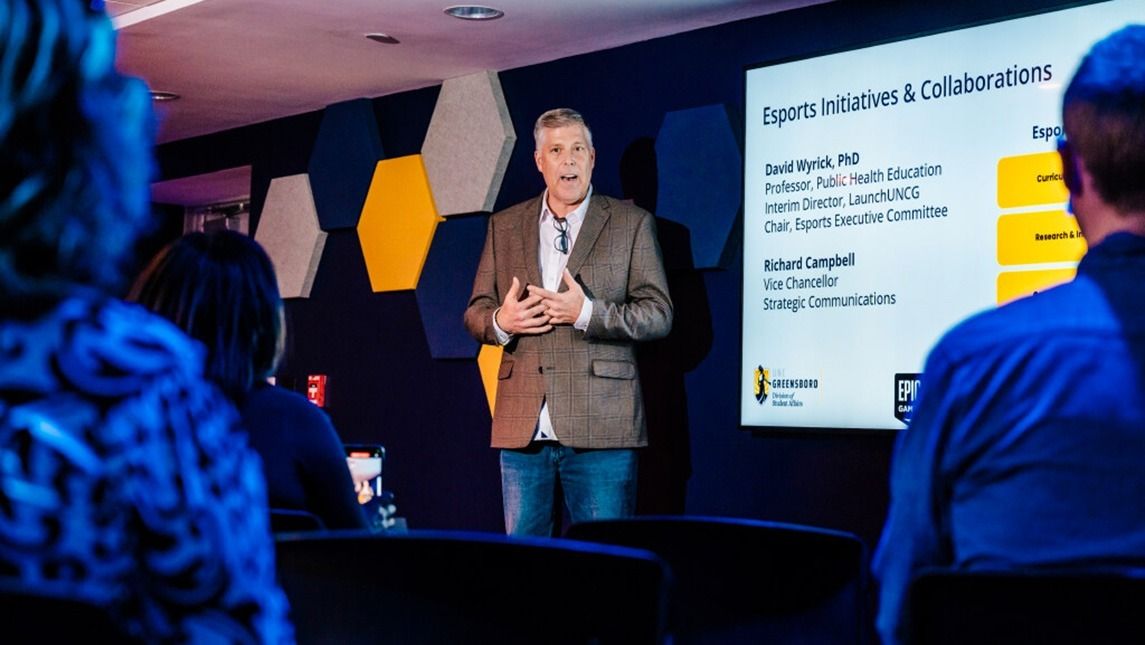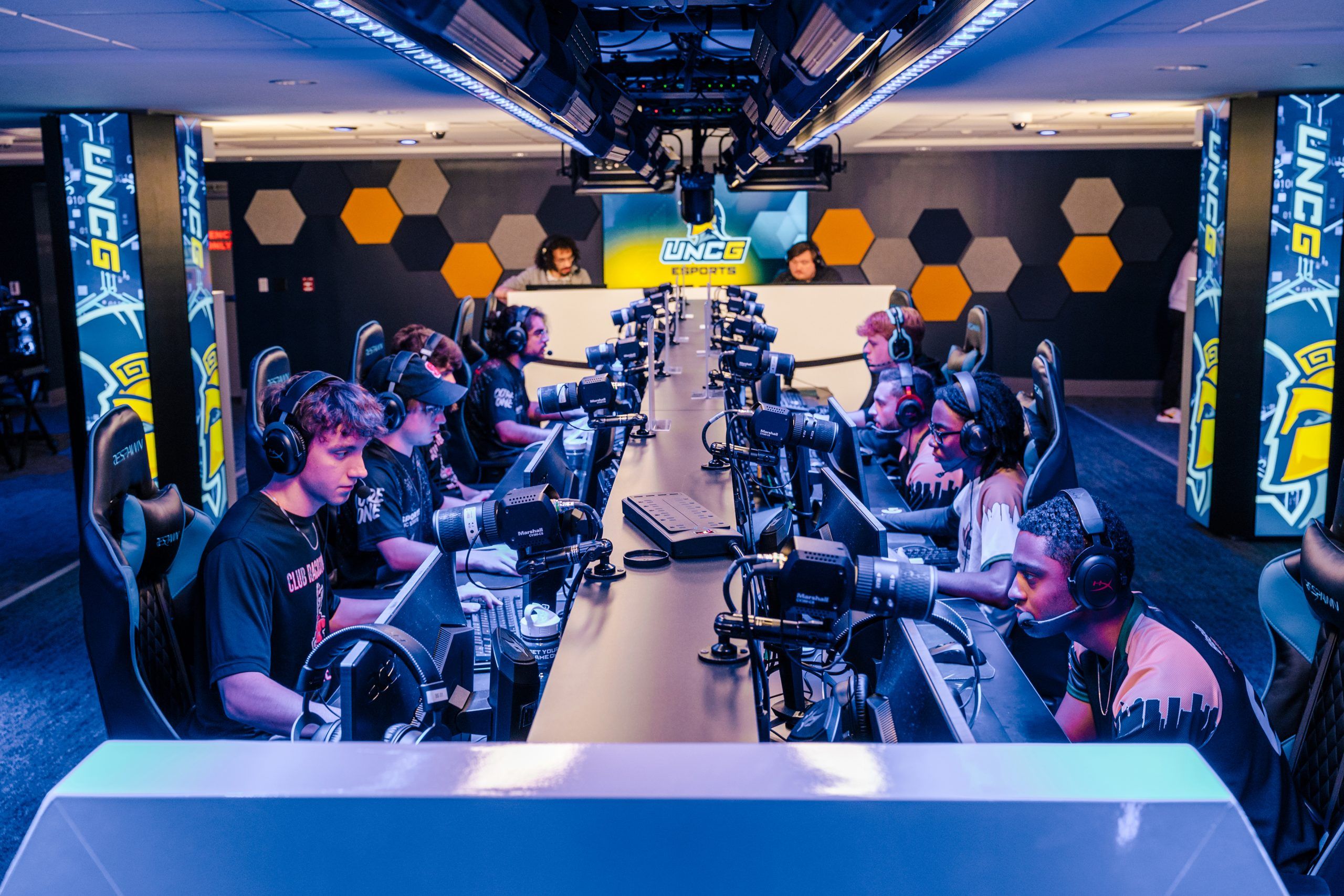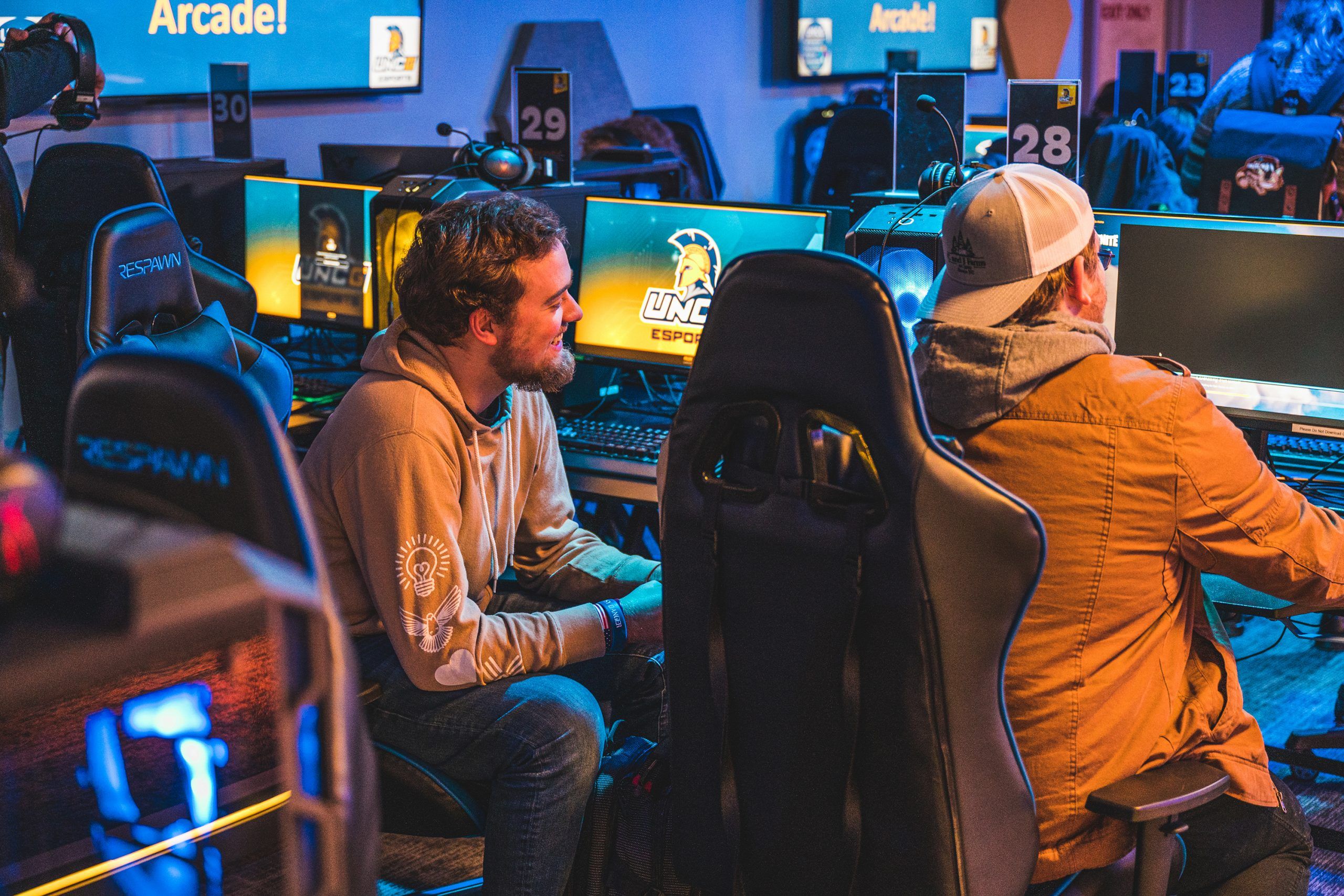RESEARCH
AT PLAY
RESEARCH
AT PLAY
UNCG has joined the collegiate esports movement with a $2.4 million state-of-the-art facility.
But gamers aren’t the only ones stepping into the arena.
ESPORTS ATHLETE HEALTH
Public health education professor David Wyrick launched the UNCG Center for Athlete Well-Being for research on the physical and mental health of athletes of all ages.
Through the center, his spinoff company Prevention Strategies, LLC, and partnerships with major players in the industry – including the NCAA and NFL – Dr. Wyrick and his team takes their findings into the classroom and onto the court.
“Maximizing public health impact is my priority,” he says. “Our commercialization efforts also inform the scholarship, leading to more manuscripts and grant proposals. So, it’s this 360 degree cycle.”
Now, Wyrick and his team are taking their expertise into the world of esports student-athlete health – an area where they say there is a strong need for foundational research.
“Collegiate esports athletes compete at a very high level that requires hours of physical, mental, and game-specific skills training,” Wyrick says. “This can result in pressures and environments that challenge their well-being.”
The researchers recently launched a survey to better understand the scope of esports athlete wellness. The groundbreaking study is led by Prevention Strategies’ experts Dr. Annie Kearns Davoren – a former NCAA consultant – and Dr. Stephen Hebard.
“What we’re doing is completely novel,” Davoren says. “We’re taking this 1,000-foot view of the esports student-athlete participant.”

“We’re just getting started,” says Wyrick.
“Esports is the most exciting thing I’ve seen in my career to help push translational research and innovation forward.”
“We’re just getting started,” says Wyrick.
“Esports is the most exciting thing I’ve seen in my career to help push translational research and innovation forward.”
EVIL & MORALITY IN GAMING
“Studying video gaming and the problem of evil fosters media literacy and allows us to make ethical choices in this brave new digital world.”
Religious studies professor Gregory Grieve observes a group of gamers facing a dilemma.
They have reached an infamous point in the 2009 video game “Call of Duty: Modern Warfare 2” – the controversial level known as No Russian – where players enter an airport and join a group of gunmen who attack bystanders at a security checkpoint.
Violence is par-for-the-course in Call of Duty. But these players, who are part of an evangelical Christian group, wonder if there’s a way to avoid harming the unarmed civilians.
“How can they mesh their Christian notions of right and wrong with what’s going on?” Dr. Grieve wonders. It’s these types of moral decisions that have piqued Grieve’s interest since 2007 and prompted his research on the concept of evil in video gaming.
“A lot of times video games are just ignored or they’re dismissed as frivolous entertainment, but a lot of them have deep ethical choices that the players have to make,” says Grieve, who is director of UNCG’s Network for the Cultural Study of Videogaming and a founding member of the International Academy for the Study of Gaming and Religion.
He defines evil as actions that most people would consider outside of ethical norms. “We just can’t understand morally why someone would do it.”
GAMING ETHNOGRAPHY
Sophia Rosenberg, a sophomore double majoring in anthropology and religious studies, is an active member of UNCG’s Network for the Cultural Study of Videogaming.
“I am a gamer myself, and I love studying people who play games,” they say. With guidance from Dr. Grieve, Rosenberg conducted an ethnography of players of the survival game Valheim.
“The fact that academia is becoming more open to studying gaming and is now realizing that video games are very important cultural artifacts is extremely exciting.”
Their project, which explored power dynamics in ethnographic research, was a first place winner at the 2022 UNCG Thomas Undergraduate Research and Creativity Expo.
Rosenberg hopes to attend graduate school and become a user experience researcher specializing in gaming. In the meantime, they are active in outreach events through the network.
“It’s exciting to connect with students and show them a different, more playful side to academia,” Rosenberg says.
Sophia Rosenberg, a sophomore double majoring in anthropology and religious studies, is an active member of UNCG’s Network for the Cultural Study of Videogaming.
“I am a gamer myself, and I love studying people who play games,” they say. With guidance from Dr. Grieve, Rosenberg conducted an ethnography of players of the survival game Valheim.
“The fact that academia is becoming more open to studying gaming and is now realizing that video games are very important cultural artifacts is extremely exciting.”
Their project, which explored power dynamics in ethnographic research, was a first place winner at the 2022 UNCG Thomas Undergraduate Research and Creativity Expo.
Rosenberg hopes to attend graduate school and become a user experience researcher specializing in gaming. In the meantime, they are active in outreach events through the network.
“It’s exciting to connect with students and show them a different, more playful side to academia,” Rosenberg says.
“Conducting research with Professor Grieve was something I never expected, but I would not trade it for anything else. For me, it solidified what I want to do in my future career.”
COMMUNITY OF GAMERS
From freshmen to tenured faculty, UNCG gamers bond over shared interests, exchange ideas, and bring scholarship to the broader community, thanks to the new Network for the Cultural Study of Video Gaming.
Associate director Dr. John Borchert says the network, known as the NCSV, was founded in 2021 with the goals of fostering research, education, and outreach.
“What’s really innovative about what we’re doing is the integration of education and research,” Borchert says. “This gives students and faculty a well-rounded approach to game cultures and esports.”
Within the classroom, students and faculty are delving into curricula that connect gaming to well-established fields, from sports broadcasting to digital animation.
In the network’s first year, faculty have developed 9 new courses. Examples include Playing Games and the Ancient World, Environmental Justice in Video Games and Literature, and Game Over: Video Gaming and Death.
“These courses offer a new avenue for student interest and for faculty exploration of new horizons in their research agendas,” Borchert says.
The network is building on this momentum by launching the Videogaming and Esports Studies minor, which will be available to students beginning this fall.
“Students in the minor will have a unique combination of critical thinking and applied skills,” says Borchert, “to engage in all aspects of the gaming and new media industries ranging from production, broadcasting, journalism, scholarship, and event and recreation management.”
The NCSV engages in a range of outreach events to connect gamers. Last year, they helped launch the UNCG Esports & Gaming Summer Camp for 9 to 14 year olds.
The network is also fostering conversation on campus through the Ashby Dialogue series, a yearly discussion group bringing together about 20 faculty and students across disciplines for focused inquiry. This year their topic is identity and queer culture in the popular video game Zelda.
“Games in general have always been a space for the marginalized to find a sense of empowerment, expertise, and a community,” says Borchert.
“Gaming is for everybody.”

